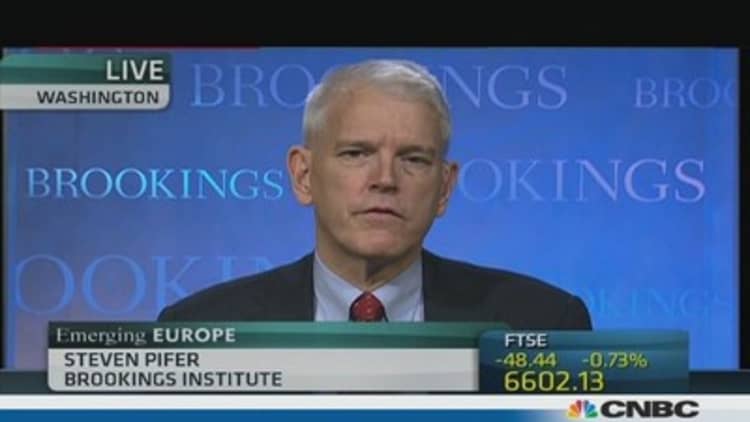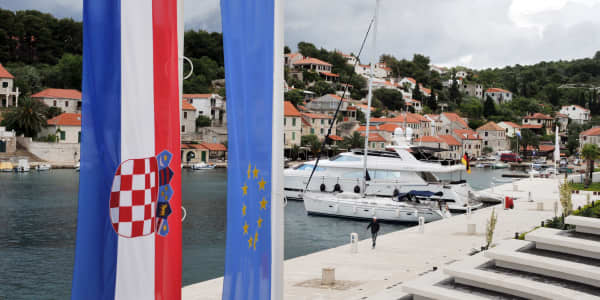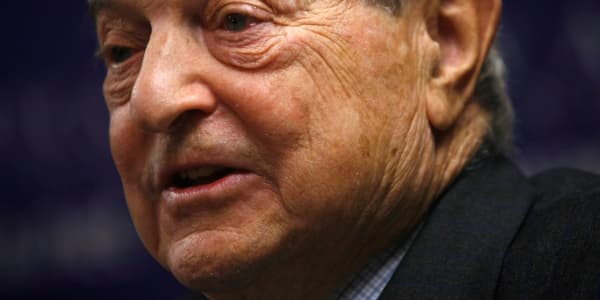Massive protests against Viktor Yanukovich hammered Ukraine's financial markets on Monday, increasing the risk of a currency crisis as the president tries to hold on until an election in early 2015.
Ukraine's debt insurance costs jumped and currency traders increased bets on a devaluation after 350,000 people protested on Sunday against Yanukovich's decision to ditch a trade pact with the European Union.
Central bank Governor Ihor Sorkin backed up foreign exchange intervention by vowing to do everything needed to uphold financial stability. In an online video message, he urged savers "to be confident in the banking system" and not to withdraw their deposits.
Yet even though the protest was the largest since the Orange revolution that overturned Yanukovich's election victory in 2004, analysts stopped short of predicting wholesale upheaval.
(Read more: )

"I'm trying to work out when a country has ever provoked a revolution over a trade deal," said Charles Robertson, global chief economist at Renaissance Capital in London.
Robertson contrasted today's situation with the Orange revolution over electoral fraud, and the economic collapse in another ex-Soviet state, Georgia, that preceded its 2003 Rose revolution.
Data provider Markit quoted five-year credit default swaps (CDS) at 1067 basis points, the highest since September, after a close of 972 bps on Friday.
Ukraine's dollar bonds fell, with its 2020 issue losing 3 points to 85 percent of par, its lowest since early 2012. The June 2014 bond also fell, pushing its yield towards 20 percent.
Western analysts were unsettled by TV footage of violence near the presidential office in Kiev, where masked protesters and the driver of an excavator clashed with helmeted riot police massed several men deep.
Mainstream opposition leaders, including former heavyweight boxer Vitaly Klitschko, called the breakaway group provocateurs and urged peaceful action.
Security forces halted a convoy of protesters' cars on Sunday evening on its way to Yanukovich's official residence outside the city, according to reports.
(Read more: Massive anti-government rally in Ukraine turns violent)
"He survived the weekend - I did think it was a Ceausescu-type scenario," said Tim Ash at Standard Bank in London, referring to the overthrow and execution of Romanian communist leader Nicolai Ceausescu in 1989.
Ash was surprised at the relatively mild sell-off in Ukrainian assets after the failure of last week's EU summit in Vilnius. "Orange Revolution 2 is on," he said. "The stakes are much higher now."
External deficits
To grow, Ukraine's $176 billion economy needs gas imports from Russia to be cheap and its steel exports to be expensive.
The opposite is now the case. The government ends up taking the strain because it subsidises most of the cost of gas sold to households across the country of 46 million that borders Russia to the northeast and four new EU states to the west.
Yanukovich walked away from the trade deal because it lacked a hoped-for stand-by loan of as much as $15 billion from the International Monetary Fund.
(Read more: Ukraine may gain 'short-term benefits' by move east)
The global lender was not prepared to lend new money without gas-price reforms.
Russian President Vladimir Putin has meanwhile made a gas discount conditional on Ukraine joining a Russia-led customs bloc that includes Kazakhstan and Belarus. He has not, however, ruled out possible further funding.
Jacob Nell, a Moscow-based economist at Morgan Stanley, estimates that Ukraine will have to raise external financing of $18 billion for Yanukovich to make it to the 2015 election.
Yet he does not see risks of financial instability becoming acute until late 2014 - as external deficits tend to widen seasonally later in the year. Without new money, forex reserves may fall below the two months' import cover viewed as critical.
"The Ukrainian authorities are likely to face a difficult choice in 2014 between joining the Customs Union ... or a rising risk of an uncontrolled forex adjustment in the second half of 2014," Nell wrote in a report on Monday.
Ukraine, which runs a 'crawling' peg of its hryvnia to the dollar, last devalued in 2008. The central bank on Monday offered to sell dollars at 8.1502 hryvnia per dollar, compared to 8.1397 hryvnia on Nov. 14.
Analysts worry less about the risk of sovereign default: Nell calculates that the sovereign must repay $8 billion before the election, of which half is owed to the IMF.
Emerging markets investor Templeton was reported to have held a $5 billion Ukraine position in August, making its behaviour key to the performance of the country's bonds.
Centrifugal forces
Energy analysts, meanwhile, doubt that Putin will rush to the aid of Yanukovich after years of acrimony between Kiev and Moscow over gas.
A deal signed in 2009 by former Prime Minister Yulia Tymoshenko led to her conviction and imprisonment for abuse of office and left Ukraine paying the highest price of any European buyer of Russian gas.
Rather than lend more money to Yanukovich, Putin may prefer to spend it on completing the South Stream gas export pipeline, the second of two sub sea links to Europe that seek to reduce risks of supply disruptions by skirting Ukraine.
"Good relations between Russia and Ukraine would have killed South Stream - the pet project of Vladimir Putin," said Mikhail Korchemkin of U.S.-based consultancy East European Gas Analysis.
With outside support lacking, there are fears that the centrifugal forces that have characterised Ukraine's history on the borderlands of eastern and central Europe could come increasingly into play. Yanukovich is from the Russian-speaking east, while protests have been large in cities in the west.
"One part of the country (is) willing to go the EU way and the other willing to go to Russia," said Regis Chatellier, global sovereign credit strategist at Societe Generale.
"The problem is this ... is happening precisely at the moment when the country is facing major, major economic challenges."




